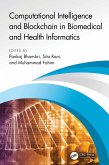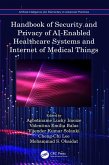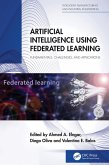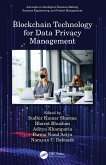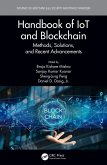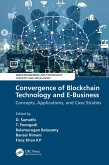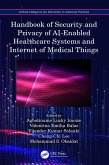Computational Intelligence and Blockchain in Biomedical and Health Informatics (eBook, PDF)
Redaktion: Bhambri, Pankaj; Fahim, Muhammad; Rani, Sita
170,95 €
170,95 €
inkl. MwSt.
Sofort per Download lieferbar

85 °P sammeln
170,95 €
Als Download kaufen

170,95 €
inkl. MwSt.
Sofort per Download lieferbar

85 °P sammeln
Jetzt verschenken
Alle Infos zum eBook verschenken
170,95 €
inkl. MwSt.
Sofort per Download lieferbar
Alle Infos zum eBook verschenken

85 °P sammeln
Computational Intelligence and Blockchain in Biomedical and Health Informatics (eBook, PDF)
Redaktion: Bhambri, Pankaj; Fahim, Muhammad; Rani, Sita
- Format: PDF
- Merkliste
- Auf die Merkliste
- Bewerten Bewerten
- Teilen
- Produkt teilen
- Produkterinnerung
- Produkterinnerung

Bitte loggen Sie sich zunächst in Ihr Kundenkonto ein oder registrieren Sie sich bei
bücher.de, um das eBook-Abo tolino select nutzen zu können.
Hier können Sie sich einloggen
Hier können Sie sich einloggen
Sie sind bereits eingeloggt. Klicken Sie auf 2. tolino select Abo, um fortzufahren.

Bitte loggen Sie sich zunächst in Ihr Kundenkonto ein oder registrieren Sie sich bei bücher.de, um das eBook-Abo tolino select nutzen zu können.
Advancements in computational intelligence, which encompasses artificial intelligence, machine learning, and data analytics, have revolutionized the way we process and analyze biomedical and health data. These techniques offer novel approaches to understanding complex biological systems, improving disease diagnosis, and more.
- Geräte: PC
- mit Kopierschutz
- eBook Hilfe
Andere Kunden interessierten sich auch für
![Computational Intelligence and Blockchain in Biomedical and Health Informatics (eBook, ePUB) Computational Intelligence and Blockchain in Biomedical and Health Informatics (eBook, ePUB)]() Computational Intelligence and Blockchain in Biomedical and Health Informatics (eBook, ePUB)170,95 €
Computational Intelligence and Blockchain in Biomedical and Health Informatics (eBook, ePUB)170,95 €![Handbook of Security and Privacy of AI-Enabled Healthcare Systems and Internet of Medical Things (eBook, PDF) Handbook of Security and Privacy of AI-Enabled Healthcare Systems and Internet of Medical Things (eBook, PDF)]() Handbook of Security and Privacy of AI-Enabled Healthcare Systems and Internet of Medical Things (eBook, PDF)72,95 €
Handbook of Security and Privacy of AI-Enabled Healthcare Systems and Internet of Medical Things (eBook, PDF)72,95 €![Artificial Intelligence Using Federated Learning (eBook, PDF) Artificial Intelligence Using Federated Learning (eBook, PDF)]() Artificial Intelligence Using Federated Learning (eBook, PDF)51,95 €
Artificial Intelligence Using Federated Learning (eBook, PDF)51,95 €![Blockchain Technology for Data Privacy Management (eBook, PDF) Blockchain Technology for Data Privacy Management (eBook, PDF)]() Blockchain Technology for Data Privacy Management (eBook, PDF)51,95 €
Blockchain Technology for Data Privacy Management (eBook, PDF)51,95 €![Handbook of IoT and Blockchain (eBook, PDF) Handbook of IoT and Blockchain (eBook, PDF)]() Handbook of IoT and Blockchain (eBook, PDF)48,95 €
Handbook of IoT and Blockchain (eBook, PDF)48,95 €![Convergence of Blockchain Technology and E-Business (eBook, PDF) Convergence of Blockchain Technology and E-Business (eBook, PDF)]() Convergence of Blockchain Technology and E-Business (eBook, PDF)55,95 €
Convergence of Blockchain Technology and E-Business (eBook, PDF)55,95 €![Handbook of Security and Privacy of AI-Enabled Healthcare Systems and Internet of Medical Things (eBook, ePUB) Handbook of Security and Privacy of AI-Enabled Healthcare Systems and Internet of Medical Things (eBook, ePUB)]() Handbook of Security and Privacy of AI-Enabled Healthcare Systems and Internet of Medical Things (eBook, ePUB)72,95 €
Handbook of Security and Privacy of AI-Enabled Healthcare Systems and Internet of Medical Things (eBook, ePUB)72,95 €-
-
-
Advancements in computational intelligence, which encompasses artificial intelligence, machine learning, and data analytics, have revolutionized the way we process and analyze biomedical and health data. These techniques offer novel approaches to understanding complex biological systems, improving disease diagnosis, and more.
Dieser Download kann aus rechtlichen Gründen nur mit Rechnungsadresse in A, B, BG, CY, CZ, D, DK, EW, E, FIN, F, GR, HR, H, IRL, I, LT, L, LR, M, NL, PL, P, R, S, SLO, SK ausgeliefert werden.
Produktdetails
- Produktdetails
- Verlag: Taylor & Francis eBooks
- Seitenzahl: 360
- Erscheinungstermin: 19. Juni 2024
- Englisch
- ISBN-13: 9781040044094
- Artikelnr.: 70427219
- Verlag: Taylor & Francis eBooks
- Seitenzahl: 360
- Erscheinungstermin: 19. Juni 2024
- Englisch
- ISBN-13: 9781040044094
- Artikelnr.: 70427219
- Herstellerkennzeichnung Die Herstellerinformationen sind derzeit nicht verfügbar.
Dr. Pankaj Bhambri works in the Department of Information Technology at Ludhiana's Guru Nanak Dev Engineering College. He serves as the Institute's Coordinator, Skill Enhancement Cell, and has almost two decades of teaching experience. He earned his M.Tech. (CSE) and a B.E. (IT) with honors from the I.K.G. Punjab Technical University, Jalandhar, India, and Dr. B.R. Ambedkar University, Agra, India, respectively. Dr. Bhambri earned his doctorate in computer science and engineering from the I.K.G. Punjab Technical University, Jalandhar, India. His research has appeared in a variety of prestigious international/national journals and conference proceedings and he has contributed to numerous books and has also filed several patents. Dr. Bhambri has been awarded the ISTE Best Teacher Award in 2023 and 2022, the I2OR National Award in 2020, the Green ThinkerZ Top 100 International Distinguished Educators in 2020, the I2OR Outstanding Educator Award in 2019, the LCHC Best Teacher Award in 2007, the CIPS Rashtriya Rattan Award in 2008, and the SAA Distinguished Alumni Award in 2012 along with countless other accolades from various government and non-profit organizations. Machine Learning, Bioinformatics, Wireless Sensor Networks, and Network Security are his areas of interest. Dr. Sita Rani is working as an Assistant Professor in the Department of Computer Science and Engineering at Guru Nanak Dev Engineering College, Ludhiana. She has served as Deputy Dean (Research) at Gulzar Group of Institutions, Khanna (Punjab). Dr. Rani completed her B.Tech and M.Tech degrees in the faculty of Computer Science and Engineering from Guru Nanak Dev Engineering College, Ludhiana. She earned her Ph.D. in Computer Science and Engineering from I.K.Gujral Punjab Technical University, Kapurthala, Punjab in the year 2018 and has more than 19 years of teaching experience. She is the receiver of ISTE Section Best Teacher Award- 2020, and International Young Scientist Award-2021. She has contributed to various research activities while publishing articles in renowned journals and conference proceedings. She has three international patents to her credit as well. Her research interest includes Parallel and Distributed Computing, Machine Learning, and the Internet of Things (IoT). Dr. Muhammad Fahim is a Lecturer (Assistant Professor) in AI theme at the School of Electronics, Electrical Engineering and Computer Science (EEECS), Queen's University Belfast, and a member of the Centre for Data Sciences and Scalable Computing (DSSC), and hold a fellowship Global Institute for Innovation. Fahim worked as an Assistant Professor at the Institute of Data Science and Artificial Intelligence, Innopolis University, Russia from Sept. 2017 to June 2021. He also served as an Assistant Professor in the Department of Computer Engineering at Istanbul Sabahattin Zaim University, Istanbul, Turkey, and led a machine learning research lab for 3 years (i.e., Sept. 2014 to Aug. 2017). Fahim earned Ph.D. in Artificial Intelligence and made a significant contribution to the ubiquitous lifecare research center in Seoul, South Korea. His contributions to this field are based on the design and development of novel machine-learning models to process the sensory data streams collected in smart environments including smart homes, buildings, and wearables.
1. Bioengineering and Healthcare Data Analysis: Introduction, Advances, and
Challenges. 2. Biomedical Engineering Modelling and Simulation. 3.
Information Extraction and Knowledge Discovery in Biomedical Engineering
and Health Informatics. 4. Distributed Frameworks: Applications and
Security Issues. 5. Blockchain Technology Framework: Issues and Future
Challenges. 6. Blockchain Technology State of Art and Future Scenario.
7. Security Aspects of Blockchain Technology. 8. Computational Intelligence
and Blockchain in Diversified Applications. 9. Computational Intelligence
and Blockchain in Distributed Applications: Benefits and Challenges. 10.
Computational and Blockchain Methods in Distributed Biomedical and Health
Informatics: Applications: Architecture, Applications, and Challenges. 11.
Healthcare Computational Intelligence and Blockchain: Real-Life
Applications. 12. Intelligent Development in Healthcare With the Internet.
13. Intelligent Development in Healthcare With the Internet: Case Study I.
14. Intelligent Development in Healthcare With the Internet: Case Study II.
15. Unleashing the Potential of Blockchain in Healthcare: A Comparative
Analysis of Leading Companies. 16. Threat Analysis and Security Measures
for the Internet of Medical Things (IoMT): A Study. 17. Leveraging Web 3.0
to Develop Play-to-Earn Apps in Healthcare using Blockchain. 18.
Advancements in Modelling, Imaging, and Simulation of Cardiovascular
Diseases: A Technological Revolution in Modern Healthcare. 19.
Blockchain-Enhanced Convolutional Neural Networks for Efficient Detection
of Cardiovascular Abnormalities. 20. Research Landscape of Blockchain and
Computational Intelligence in Healthcare and Biomedical Fields: A
Bibliometric Analysis. 21. Bone Marrow Cancer Detection From Leukocytes
using Neural Networks. 22. Pulmonary and Lungs Nodule Classification using
Deep Learning.
Challenges. 2. Biomedical Engineering Modelling and Simulation. 3.
Information Extraction and Knowledge Discovery in Biomedical Engineering
and Health Informatics. 4. Distributed Frameworks: Applications and
Security Issues. 5. Blockchain Technology Framework: Issues and Future
Challenges. 6. Blockchain Technology State of Art and Future Scenario.
7. Security Aspects of Blockchain Technology. 8. Computational Intelligence
and Blockchain in Diversified Applications. 9. Computational Intelligence
and Blockchain in Distributed Applications: Benefits and Challenges. 10.
Computational and Blockchain Methods in Distributed Biomedical and Health
Informatics: Applications: Architecture, Applications, and Challenges. 11.
Healthcare Computational Intelligence and Blockchain: Real-Life
Applications. 12. Intelligent Development in Healthcare With the Internet.
13. Intelligent Development in Healthcare With the Internet: Case Study I.
14. Intelligent Development in Healthcare With the Internet: Case Study II.
15. Unleashing the Potential of Blockchain in Healthcare: A Comparative
Analysis of Leading Companies. 16. Threat Analysis and Security Measures
for the Internet of Medical Things (IoMT): A Study. 17. Leveraging Web 3.0
to Develop Play-to-Earn Apps in Healthcare using Blockchain. 18.
Advancements in Modelling, Imaging, and Simulation of Cardiovascular
Diseases: A Technological Revolution in Modern Healthcare. 19.
Blockchain-Enhanced Convolutional Neural Networks for Efficient Detection
of Cardiovascular Abnormalities. 20. Research Landscape of Blockchain and
Computational Intelligence in Healthcare and Biomedical Fields: A
Bibliometric Analysis. 21. Bone Marrow Cancer Detection From Leukocytes
using Neural Networks. 22. Pulmonary and Lungs Nodule Classification using
Deep Learning.
1. Bioengineering and Healthcare Data Analysis: Introduction, Advances, and
Challenges. 2. Biomedical Engineering Modelling and Simulation. 3.
Information Extraction and Knowledge Discovery in Biomedical Engineering
and Health Informatics. 4. Distributed Frameworks: Applications and
Security Issues. 5. Blockchain Technology Framework: Issues and Future
Challenges. 6. Blockchain Technology State of Art and Future Scenario.
7. Security Aspects of Blockchain Technology. 8. Computational Intelligence
and Blockchain in Diversified Applications. 9. Computational Intelligence
and Blockchain in Distributed Applications: Benefits and Challenges. 10.
Computational and Blockchain Methods in Distributed Biomedical and Health
Informatics: Applications: Architecture, Applications, and Challenges. 11.
Healthcare Computational Intelligence and Blockchain: Real-Life
Applications. 12. Intelligent Development in Healthcare With the Internet.
13. Intelligent Development in Healthcare With the Internet: Case Study I.
14. Intelligent Development in Healthcare With the Internet: Case Study II.
15. Unleashing the Potential of Blockchain in Healthcare: A Comparative
Analysis of Leading Companies. 16. Threat Analysis and Security Measures
for the Internet of Medical Things (IoMT): A Study. 17. Leveraging Web 3.0
to Develop Play-to-Earn Apps in Healthcare using Blockchain. 18.
Advancements in Modelling, Imaging, and Simulation of Cardiovascular
Diseases: A Technological Revolution in Modern Healthcare. 19.
Blockchain-Enhanced Convolutional Neural Networks for Efficient Detection
of Cardiovascular Abnormalities. 20. Research Landscape of Blockchain and
Computational Intelligence in Healthcare and Biomedical Fields: A
Bibliometric Analysis. 21. Bone Marrow Cancer Detection From Leukocytes
using Neural Networks. 22. Pulmonary and Lungs Nodule Classification using
Deep Learning.
Challenges. 2. Biomedical Engineering Modelling and Simulation. 3.
Information Extraction and Knowledge Discovery in Biomedical Engineering
and Health Informatics. 4. Distributed Frameworks: Applications and
Security Issues. 5. Blockchain Technology Framework: Issues and Future
Challenges. 6. Blockchain Technology State of Art and Future Scenario.
7. Security Aspects of Blockchain Technology. 8. Computational Intelligence
and Blockchain in Diversified Applications. 9. Computational Intelligence
and Blockchain in Distributed Applications: Benefits and Challenges. 10.
Computational and Blockchain Methods in Distributed Biomedical and Health
Informatics: Applications: Architecture, Applications, and Challenges. 11.
Healthcare Computational Intelligence and Blockchain: Real-Life
Applications. 12. Intelligent Development in Healthcare With the Internet.
13. Intelligent Development in Healthcare With the Internet: Case Study I.
14. Intelligent Development in Healthcare With the Internet: Case Study II.
15. Unleashing the Potential of Blockchain in Healthcare: A Comparative
Analysis of Leading Companies. 16. Threat Analysis and Security Measures
for the Internet of Medical Things (IoMT): A Study. 17. Leveraging Web 3.0
to Develop Play-to-Earn Apps in Healthcare using Blockchain. 18.
Advancements in Modelling, Imaging, and Simulation of Cardiovascular
Diseases: A Technological Revolution in Modern Healthcare. 19.
Blockchain-Enhanced Convolutional Neural Networks for Efficient Detection
of Cardiovascular Abnormalities. 20. Research Landscape of Blockchain and
Computational Intelligence in Healthcare and Biomedical Fields: A
Bibliometric Analysis. 21. Bone Marrow Cancer Detection From Leukocytes
using Neural Networks. 22. Pulmonary and Lungs Nodule Classification using
Deep Learning.

